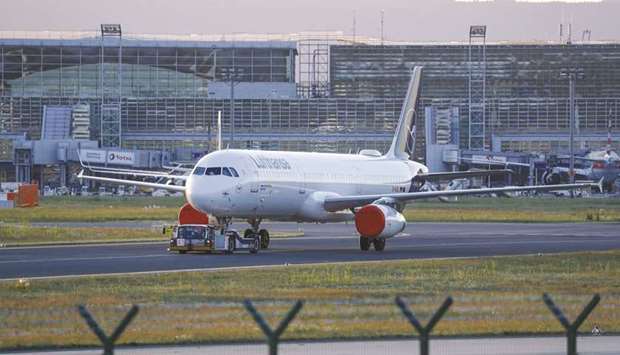The German government worked out its differences with the European Commission over a 9bn euro ($9.9bn) bailout of Deutsche Lufthansa AG, clearing the way for the rescue of Europe’s biggest airline to move forward.
After intense talks, the commission and the German government agreed that Lufthansa will reduce its presence at airports in Frankfurt and Munich by four aircraft each. The accord, which the airline’s management said it would accept, would give a toehold to new competitors hoping to challenge the dominant German carrier on its home turf.
The compromise settles a high-stakes showdown that played out over the past week, pitting the European Union’s most powerful member state against the regulator tasked with ensuring fairness in the bailout process.
The economic damage of the coronavirus crisis has unleashed an unprecedented gusher of state aid, led by Germany’s 600bn euro ($666bn) effort to shore up its economy.
With Lufthansa’s future in the balance, Germany on Monday offered Lufthansa a package of loans and equity investment to keep the carrier aloft. But after the EU demanded it give up slots in Munich and Frankfurt, the airline’s supervisory board unexpectedly held off on accepting this lifeline – throwing the rescue plan into turmoil after weeks of talks.
The concessions are “not insignificant” for Lufthsansa, said Stephen Furlong, an analyst with Davy Stockbrokers in Dublin.
The agreement still requires approval of Lufthansa’s supervisory board, followed by a formal signoff by the EU, which polices state aid to ensure one country doesn’t give its companies an unfair advantage.The bloc’s regulators will then assess the German aid package “as a matter of priority,” the EU said yesterday.
A spokeswoman for Germany’s economy ministry said an important milestone had been reached, adding talks with the EU over other aspects of the deal would continue.
Lufthansa said in a statement that it would surrender as many as 24 takeoff-and-landing slots at Munich and the same at Frankfurt – enough for a competitor to base four planes doing three daily round-trips. This reflects a reduction in the initial demands from the EU, it said.
The commitments will “enable a viable entry or expansion of activities by other airlines at these airports to the benefit of consumers and effective competition,” the European Commission said in an e-mailed statement.
There are significant catches, however, that suggest the strongest potential beneficiaries, such as Ryanair Holdings Plc – a loud critic of the Lufthansa aid – won’t be able to fully take advantage of the slots.
For the first 18 months, the capacity is reserved for new competitors in Frankfurt and Munich. With the global airline industry in retreat, the likelihood of a fresh entrant may be limited.
Of the two main European discount carriers, Dublin-based Ryanair already has slots at Frankfurt’s main airport. UK-based Easyjet Plc has a presence in Munich. Each would be unable to use the new capacity in the location where it’s already planted a flag.
Another growing low-cost carrier, Wizz Air Holdings Plc, recently pulled out of Frankfurt. In an interview, chief executive officer Jozsef Varadi called the bailout “market distorting,” and said the slots don’t come close to balancing out the amount of aid Lufthansa is getting.
He said he’ll consider the capacity on offer, but cautioned it will depend on details including costs, which are higher for point-to-point operators like Wizz because of transfer discounts granted in Frankfurt.
“We need to look at whether there is any way of taking advantage of this,” Varadi said. “We need to know more about the process of applying for the slots and what the conditions are, and also what slot pairs we are talking about, the time of day, the rotations.”
The slot pairs will be allocated in a bidding process, Lufthansa said, and only be available to European carriers that haven’t received substantial state recapitalisation due to the coronavirus pandemic.
The supervisory board’s rejection of the initial rescue proposal had triggered an open dispute between the German government and the EU commission, revealing the political tensions underpinning the effort to stabilise Europe’s largest airline in the midst of a historic collapse in travel. The labour-heavy supervisory board saw a threat that jobs would be lost and the market would shift toward the discount airlines, which pay their personnel less.
Still, all sides were seeking a breakthrough. Even before the compromise, the board had called the bailout “the only viable alternative for maintaining solvency.”
“Lufthansa is indeed a very impressive company and they have market power,” EU competition watchdog Margrethe Vestager told reporters in Brussels on Friday. “There is a high risk that if you hold market power” that “competition will be disturbed,” especially when state recapitalisations strengthen a company.

A Deutsche Lufthansa passenger aircraft is towed at Frankfurt Airport on May 28. The German government worked out its differences with the European Commission over a $9.9bn bailout of Lufthansa, clearing the way for the rescue of Europe’s biggest airline to move forward.
